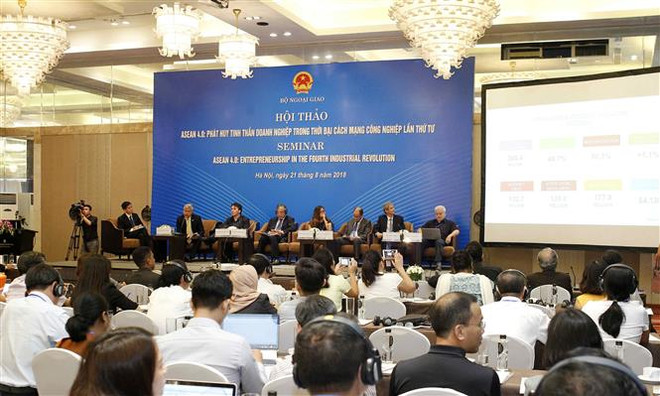 A workshop themed "ASEAN 4.0: entrepreneurs in the fourth industrial revolution” takes place in Hanoi on August 21. (Photo: VNA)
A workshop themed "ASEAN 4.0: entrepreneurs in the fourth industrial revolution” takes place in Hanoi on August 21. (Photo: VNA)Hanoi (VNA) – Opportunities andchallenges facing ASEAN enterprises in the fourth industrial revolution (4.0)were the main discussion at a workshop hosted by the Foreign Ministry in Hanoion August 21.
The event, themed “ASEAN 4.0: entrepreneurs in thefourth industrial revolution”, forms part of activities ahead the WorldEconomic Forum (WEF) ASEAN 2018 that will take place in Hanoi from September 11-13.
It saw the participation of representatives fromASEAN embassies in Vietnam, ministries, leaders of top local technologyenterprises and economic experts.
Participants shared ideas and made policyrecommendations to help ASEAN enterprises improve their adaptation to and increasetheir participation in the 4.0 industrial revolution, thus maintaining the region’sactive development.
In his opening speech, Deputy Foreign Minister BuiThanh Son said: “Vietnam is striving for sustainable growth on the basis ofimproving the quality of growth and taking advantage of the opportunities ofthe Industrial Revolution 4.0 to increase its labour productivity andcompetitiveness to move up the ladder in the global value chain.”
Vietnam is working to be one of the world’s top 10biggest software and digital content outsourcing service nations, with about 1million employees in the IT field by 2020, Son said.
The Deputy Foreign Minister also highlighted theopportunities for ASEAN developing nations to make fast, sustainable andinclusive development in the fourth revolution.
ASEAN is the world's sixth-largest economy with 630million people, of whom, 260 million have a regular access to the Internet. Thenumber is expected to increase to 480 million by 2020.
In Vietnam, about 60 percent of the 93 million populationare under 35 years of age. They have a quick access to new technology and about55 percent of the population use the Internet.
Son cited estimates of Google and Singaporean Temasekgroups, saying that the Southeast Asian internet economy will reach 200 billionUSD by 2025, or 6 percent of the region's total GDP.
“This is a favourable foundation and a big enoughmarket for innovation and investment in new business models in the region aswell as in Vietnam,” Son said.
However, Son also highlighted challenges posed inthe 4.0 industrial revolution. Large-scale automation, changing business modelsthat cause disturbance, displacement, and employment replacement in largescale, especially in labor-intensive industries.
“This poses an urgent need for vocational educationand training in many ASEAN countries,” he said.
According to the International Labor Organisation(ILO), about 56 percent of the workforce of five ASEAN countries, namelyMalaysia, Indonesia, the Philippines, Thailand and Vietnam, are at high risk ofbeing replaced by new technologies in about two decades.
Son suggested each ASEAN Government and ASEANbusiness promote self-reliance, find new ways to adapt to and prosper in afast-paced world under the influence of new technology.
Vietnam and the World Economic Forum will co-hostthe ASEAN World Economic Forum 2018 (WEF ASEAN 2018) in Hanoi from September 11to 13.
This is one of Vietnam's biggest foreign events thisyear, attracting more than 1,000 domestic and international delegates.
The WEF ASEAN 2018 co-hosting is the initiative ofPrime Minister Nguyen Xuan Phuc and Executive Chairman of the World EconomicForum Klaus Schwab.
Under the theme "ASEAN 4.0: Enterprise Spiritin the 4th Industrial Revolution", the conference is expected to promotedialogues and share the vision, ideas and policy directions related to the 4.0revolution in ASEAN and around the world.
The agenda of the WEFASEAN 2018 was also elaborated on this year's ASEAN theme: “ASEAN Resilience and Innovation”.-VNA






























